ASSESSING THE INTERPLAY OF DIGITAL LITERACY SKILLS AND COMPUTER SELF-EFFICACY IN ENHANCING FUNCTIONAL SKILLS AT ISLAMIC SECONDARY SCHOOL LEVEL IN DISTRICT MUZAFFARGARH
Keywords:
Students Learning, Basic Computer Operations, Confidence with Computers, Essential Computer Use, Using Digital Tools.Abstract
This study tested how digital literacy affects computer self-efficacy and functional skill development through secondary assessment at Islamic schools in Muzaffargarh south Pakistan. This research uses a quantitative approach and performs its analysis with SPSS version 22. The research population consists of teachers working in Muzaffargarh south Pakistan. The research team explored 450 teachers because they represent its research focus. The aggregate linear abnormality method serves as the tool for possibility analysis within this research.Data shows digital literacy and computer self-efficacy did not influence teachers’ digital tool use while digital tools showed a definite impact since its significance value (0.000) falls below 0.05. linear abnormality method is used for possibility analysis in this study. The results of data analysis show that the digital literacy variable has a significance value of 0.067 > 0.05 and computer self-efficacy has a significance value of 0.067 > 0.05 so that it can be determined that these two variables had no effect on digital tools and functional skills in Muzaffargarh Islamic secondary school teachers, whereas the digital tolls variable has a significance value of 0.000 <0.05, it is certain that it has an influence on the use of the digital literacy tools of Muzaffargarh south Pakistan Islamic secondary teachers.
Downloads
References
Bandura, A. (1997). Self-Efficacy. The Exercise of Control. New York: WH Froeman and Company.
Compeau, DR, & Higgins, CA (1995). Computer Self-Efficacy: Development of a Measure and Initial Test. MIS Quarterly.
et al, KA (2005). The Influence of Trainee Gaming Experience and Computer Self-Efficacy on Learner Outcomes of Videogame-Based Learning Environments. Diane Publishing Co.
Dinata, KB (2021). Analysis of Students' Digital Literacy Ability. Journal of Education Vol.19, 106.
Dinata, KB (2021). Digital Literacy in Online Learning. Journal of Exponents Vol.11, 25. Eryadi, HT, & Yuliana, E. (2016). The Effect of Perceived Value and Socila Influence on 4G Smartphone Purchase Intention for Bandung Electronic Center Customers. eProceedings of Management Vol.3, 88.
Feist, J., & Feist, GJ (2010). Theories of personality. Jakarta: Salemba Humanika.
Gilster, P. (1997). Digital Literacy. New York: INC Publishers.
Hobbs, R. (2017). Create to Learn: Introduction to Digital Literacy. Inc. Publishers.
Jonathan, R., & Soelasih, Y. (2022). Formation of Intention to Use Digital Wallet Through Consumer Attitude. Journal of Management Vol.19, 41.
Mohammadyari, & Singh, H. (2015). Computers & Education Understanding the effect of elearning on individual performance: The role of digital literacy. Computers & Education.
Pandin, MY, Prihastuty, DR, Trihastuti, A., & Yustini, RS (2023). Mediation Effect of Computer Self-Efficacy, Between Learning Motivation and Learning Achievement. Journal of Management Economics, 27. Pradana, Y. (2018). Attribution of Digital Citizenship in Digital Literacy. Untirta Civic Education Journal Vol.3, 170.
Ramadhanty, VD, Permana, RI, Fauzia, BR, & Rahmawati, NA (2021). Factor Analysis of Digital Wallet Usage among Surabaya Higher Education Students. Journal of Informatics Engineering and Information Systems Vol.8, 313.
Restianty, A. (2018). Digital Literacy, A New Challenge in Media Literacy. Journal of Public Relations Vol.1, 74.
Wright, B. (2015). TOP 10 benefits of digital skills. Retrieved June 15, 2023, from Web Percent: http://webpercent.com/top-10-benefits-of-digital-skills/
Anderson, T. (2020). The theory and practice of online learning. Athabasca University Press.
Anderson, T. (2020). The theory and practice of online learning. Athabasca University Press.
Darling-Hammond, L., et al. (2017). Empowered educators: How high-performing systems shape teaching quality around the world. Wiley.
Selwyn, N. (2020). Education and technology: Key issues and debates. Bloomsbury Publishing.

Downloads
Published
Issue
Section
License
Copyright (c) 2024 PAKISTAN ISLAMICUS (An International Journal of Islamic & Social Sciences)

This work is licensed under a Creative Commons Attribution 4.0 International License.
This work is licensed under a Creative Commons Attribution 4.0 International License.
































